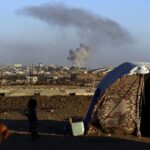

President Joe Biden is running out of time to fundraise before the end of this financial quarter as the 2024 Republican presidential candidates come under similar pressure ahead of this summer’s primary debates.
But despite being outfundraised during the 2020 primary, Biden’s reelection campaign is projecting confidence before the Federal Election Commission’s June 30 disclosure deadline, the president’s first this cycle.
BIDEN MAY BUCK BIPARTISAN VOTE TO KEEP MORTGAGE OVERHAUL IN PLACE
The Biden campaign chose not to disclose the president’s first 24- or 48-hour fundraising numbers after he announced his reelection bid in April. But the team is reminding critics Biden and Vice President Kamala Harris raised $1 billion in 2020 thanks to small-dollar donors. In comparison, former President Donald Trump brought in $774 million, according to campaign finance and lobbying data organization Open Secrets.
“We’re building on that progress, while also doing really aggressive fundraising: more than 20 fundraisers this month alone, with the four principals,” a Biden spokesman told the Washington Examiner. “There’s two pieces of the campaign that are really important: One is raising money and two is building that Biden coalition and the support that’s needed. That includes investing in the different constituencies that make up the coalition, including unions and including climate voters, and more to come.”
After Biden delayed his reelection launch from after his State of the Union address in February to April in part to maximize his opportunity to raise money, he did not start doing so until this month. But during the last four weeks, the president has appeared at eight fundraisers, including two in Maryland last Tuesday, one in Chicago on Wednesday, and two in New York on Thursday, working closely with the Democratic National Committee and, for the first time, all 50 state parties. The joint fundraising committee, called the Biden Victory Fund, raised more than $600 million in 2020 and, through the agreement, can receive $929,600 from individual donors, with next year’s general election expected to cost Biden $2 billion.
Harris, in addition to first lady Jill Biden, Harris’s husband, Doug Emhoff, campaign manager Julie Chavez Rodriguez, deputy campaign manager Quentin Fulks, and DNC Executive Director Sam Cornale, has been fundraising and conducting outreach too.
“We have a good track record of knowing what to do and seeing it through to great impact,” Harris told donors last week in Dallas. “That’s how I look at the election coming up. And I know we feel the same way.”
Aside from the potential structural advantage of the joint fundraising committee, without Trump in the White House and a competitive presidential primary, Democrats are contending with a possible political disadvantage. But while House Republicans outfundraised House Democrats last month, $7.8 million to $7.6 million, Senate Democrats raised more money than their GOP counterparts, $5 million to $3.6 million.
Meanwhile, GOP presidential candidates were advised by the Republican National Committee this month that they have until Aug. 21 to record a minimum of 40,000 unique donors, with at least 200 each in 20 different states or territories, to participate in the first primary debate in Milwaukee on Aug. 23.
“I need your help to confirm my spot on the presidential debate stage,” Sen. Tim Scott (R-SC) told supporters this week. “Seriously, just $1 will be a huge help.”
Former Govs. Chris Christie of New Jersey and Asa Hutchinson of Arkansas have urged the RNC to no longer require candidates to pledge their support to the eventual nominee to take part in the debate after Trump’s federal indictment. The former president has indicated he himself may boycott the event.
The FEC deadline coincides with a concerted effort from the White House to underscore improved post-pandemic economic conditions during Biden’s presidency.
“Today, the U.S. has had the highest economic growth among the world’s leading economies since the pandemic,” Biden told a crowd in Chicago on Wednesday. “We’ve added over 13 million jobs, more jobs in two years than any President has added in a four-year term. And folks, that’s no accident. That’s Bidenomics in action.”
But Biden seemed to bristle at the term “Bidenomics,” which the White House has co-opted from Republican critics and the Wall Street Journal’s opinion pages. The president’s average economic approval-disapproval rating is 38%-57%, according to RealClearPolitics.
“I don’t go around beating my chest ‘Bidenomics,’ so the press started calling it Bidenomics,” he told reporters on the South Lawn earlier Wednesday.
CLICK HERE TO READ MORE FROM THE WASHINGTON EXAMINER
“Do you not like it sir?” a reporter asked.
“No, I like it. It’s fine,” he said.





